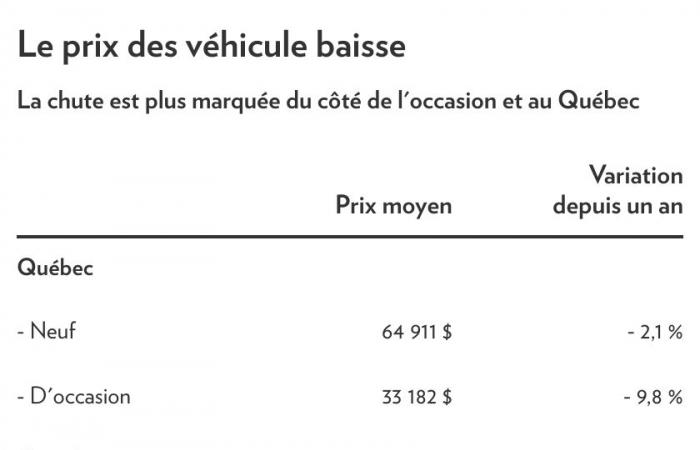40 years ago, the average annual salary in the country was around $23,000, while cars sold for $11,500. If it weren’t for taxes, it would have been possible to buy two cars with just one year’s income.
Posted at 1:28 a.m.
Updated at 6:30 a.m.
Today, we work much longer to ride.
The price of new vehicles is equivalent to 53 weeks of average gross salary, according to AutoHebdo. On the user side, Quebecers can expect their bill to correspond to 27 weeks of hard work.
In recent years, the price gap between the two has continued to increase, making second-hand vehicles more and more economical compared to new. Recent interest rate cuts are also boosting demand.
If the price of cars has changed, the same cannot be said of the reputation of used vehicle dealers. It has not been in good shape for decades, and nothing seems to be able to move the needle on the credibility dial.
So the industry didn’t really appreciate my recent column on Carfax’s history reports that don’t tell the whole story.1. The president of the Association for the Protection of Motorists (APA), George Iny, stated this: “When a salesman tells you that the Carfax is blank, or cleanhe is probably lying to you. »
Consult the column on Carfax reports
I was in a very bad position to contradict him, since a salesman tried a few months ago to sneak me an damaged vehicle by providing me, with the smile of a confident man, with a history that did not mention.
Members of the Association of Used Vehicle Dealers of Quebec (AMVOQ) can no longer stand reading this kind of story.
“Our people are very proud. So they are tired, and that’s a weak word, tired of being at the bottom of Léger’s confidence surveys and of being at the top of the Consumer Protection Office’s list of complaints. We have been campaigning for 35 years to raise the image of merchants,” the general director of AMVOQ, Steeve De Marchi, told me. He offered me a discussion on Carfax, but it was also necessary to address questions of image and professionalism.
AMVOQ would do a lot of things to improve the situation. She created barriers to entry into the association, a code of ethics, regulations… “but we have people who are creative,” laments her boss.
And this creativity would be stimulated, it seems, by the particular demands of Quebecers.
“Quebecers want something very beautiful, something very good and something really inexpensive. Which puts downward pressure on traders,” says Steeve De Marchi.

PHOTO PROVIDED BY AMVOQ
Steeve De Marchi, general director of the Association of Used Vehicle Dealers of Quebec (AMVOQ)
This is not a criticism, it is an observation: the Quebec car buyer does not have exactly the same way of purchasing as the average North American, or Canadian in fact.
Steeve De Marchi, general director of the Association of Used Vehicle Dealers of Quebec
This fervent search for “the very beautiful, the very good and the really cheap”, a trio too perfect to exist, would ensure that “certain merchants, unfortunately, will find creative, not to say recreational, ways of offering something which looks like something very beautiful, very good and really cheap. »
Steeve De Marchi also believes that we must stop “relieving responsibility from consumers” who are protected by laws. “If consumers don’t exercise their rights, at some point, that opens doors and that’s probably why the industry in general gets such a bad rap. »
He adds: “It takes two to dance. »
Human nature being what it is, there will always be smart people without morals who will try to make money at the expense of others.
It’s true in real estate brokerage (as we’ve seen repeatedly over the past two years), it’s true in the sale of heat pumps, in construction, in financial services, lark.
Do these industries cite consumer behavior to justify themselves?
To brandish this argument is to forget that ordinary mortals do not benefit from the same resources to defend themselves. This ignores the time, expertise and energy that it requires.
Nine things to do before buying
Here are some tips from the Association of Used Vehicle Dealers of Quebec (AMVOQ) to avoid problems and unpleasant surprises when making a purchase
- Before going to a merchant, check their reviews on Google. If there are enough of them, they will guide you properly. Otherwise, it has no value.
- On the Consumer Protection Office website, you can see if a company has received formal notices.
Visit the Consumer Protection Office website
- Know that a “blank Carfax is more dangerous than a Carfax full of information,” insists Steeve De Marchi, taking up the essence of the message of my column. If the vehicle is from another province and there is a break in the history (years of no information), this should raise a red flag.
- Always check the serial number on the Carfax report to make sure it matches the vehicle’s serial number. Look at the date. If the report is more than a few weeks old, bring out another one.
- If you see a police report, but no insurance claims, it may be a sign that there was a repair paid directly by the driver.
- It is very easy to roll back an odometer. The required equipment can be purchased on the internet in a few clicks. It is therefore important to recognize signs of wear that are not consistent with the kilometers on the odometer, such as a “sunken seat”, a worn brake pedal, a tarnished steering wheel, a warped seat belt. The rule of thumb is that each kilometer erased increases the value of the vehicle by 10¢ (100,000 km = $10,000).
- Always avail yourself of the right (which has existed since 2007) to have the vehicle inspected by the independent mechanic of your choice. This will be able to detect an undeclared accident by measuring the thickness of the paint and looking for parts which are not original or which are too recent. In Quebec, it is estimated that Carfax reports contain “72 or 73% of the information” since insurers do not share their data.
- Should a slightly damaged vehicle that has been properly repaired be avoided? Not necessarily. It is important to determine whether the structural integrity was affected, whether the repairs were primarily cosmetic. “Does that taint the value? It depends if you are the buyer or the seller! », notes Steve De Marchi. Everyone will have their own subjective assessment.
- If you run into trouble, check the OPC website to see if the merchant participates in the free Parle online mediation service.
Visit the Parle Consumption page








